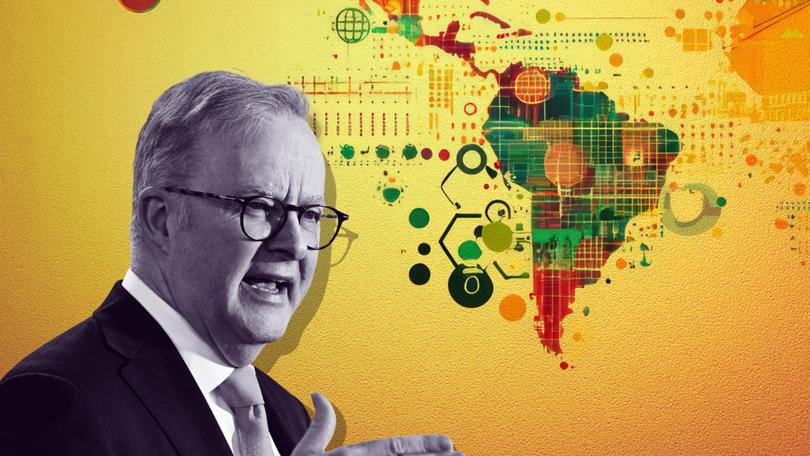Anthony Albanese is heading to South America’s twin summits. But will it all be overshadowed by Trump 2.0?
The twin South American summits will have plenty of targets and pledges for world leaders, including Anthony Albanese. But it could all be moot when Donald Trump moves back into the White House.

Prime Minister Anthony Albanese sets off on Wednesday on a high-stakes diplomatic tour of South America, with the global economy, trade, inequality and climate change high on the agenda — but the impact of Donald Trump’s return to the global stage will be the elephant in the APEC and G20 meeting rooms.
There’s no doubt that APEC in Lima and the G20 in Rio de Janeiro play “critical roles”, especially given ongoing global economic challenges. But, any talks of progress or declarations on climate cooperation and the energy transition, global peace, and the importance of free and open trade could all be moot come January when Mr Trump moves back into the White House.
Albanese will be one of many world leaders trying to gauge temperatures, given Trump’s second Administration promises to pull out of the Paris Agreement and wind back the clean energy transition, as well as implementing tariffs that will hit China hardest and potentially ignite a new trade war.
Sign up to The Nightly's newsletters.
Get the first look at the digital newspaper, curated daily stories and breaking headlines delivered to your inbox.
By continuing you agree to our Terms and Privacy Policy.There’s a push from the Coalition for the PM to tack on a visit to Florida at the end, to meet with Trump face-to-face and seek assurances that Australia won’t be worse off under his more insular foreign policy and trade agenda.
Albanese has played such suggestions down, saying it wouldn’t work logistically, and pointing to the “really constructive discussion” he had with the US President-elect via phone last week – but the idea is out there now, and depending on how the Coalition plays it, it could hang over the PM’s head the entire trip.
Politically speaking, the week-long trip to Peru and Brazil couldn’t come at a harsher time for the PM, whose popularity has taken a tumble in recent opinion polls. Voters are looking to Peter Dutton’s Coalition ahead of the next federal election, and last week’s US election results have shown just how damaging cost-of-living can be for incumbent governments.
The PM will also miss at least three days of Parliament, as time is running out for the Government to clear its desk of its policy backlog before he calls the election — due by May.
It’s a fine line he must walk, balancing foreign commitments and domestic pressures. Voters rightly have high expectations that he acts in their best interests while halfway around the world.
APEC has good intentions, under the theme banner of “Empower. Include. Grow.”, to bring Asia-Pacific leaders together to collaborate on trade, facilitating investment across the region, and transitioning to a more formal global economy.
Given APEC’s 21 economies make up 60 per cent of global GDP, Albanese is expected to promote more regional economic integration and stress the importance of free and open trade in the Asia-Pacific.
The clean energy transition and food security are also high on the summit’s agenda, but the devil will be in the detail of the communiques, outcomes, and the types of sideline bilaterals about how the regional bloc is steeling itself for the looming US pivot.
Climate change will also be a big focus of the G20 – coinciding with the COP29 conference in Azerbaijan – but the influence of China, India and Russia has already watered down much of the group’s climate change ambition to date. The looming Trump presidency could further undermine any efforts by more ambitious economies.
Brazil, as host, has also put efforts to eliminate hunger, poverty and inequality on the priority list, as well as sustainable development and global governance reform. Expect Albanese to advance Australia’s priorities of sustainable and smart agriculture to target food instability, and promote its role as a major energy supplier to the region.
The Rio Summit will also focus on the challenges to global trade and how to weather the ongoing global inflation challenge and manage arising economic headwinds.
Both are, as Albanese said, “critical” in steering regional and global economies through modern challenges.
“We are working at home and with international partners to put downward pressure on inflation and help safeguard Australia’s economy against global challenges, as well as building the new economic links that will sustain a Future Made in Australia,” he said.
Outgoing US President Joe Biden and Chinese President Xi Jinping will be at both summits. Xi is expected to use a speech at APEC to outline how China proposes to advance cooperation in the region.
Australian officials told Senate estimates last week Albanese was pursuing a meeting with Xi on the sidelines of either summit. That could prove even more an important task now that a trade war with Trump’s US is on the table.
It could be one of the last times Albanese sees Biden, and while no formal bilateral meeting is expected at this stage, the pair are sure to pull each other aside given their close friendship.
But what such a chat could tangibly yield, like the summits themselves, remains to be seen.

